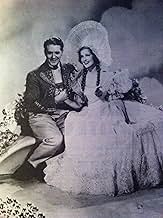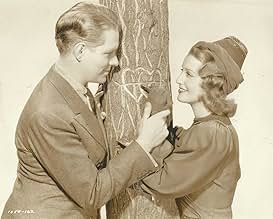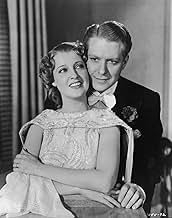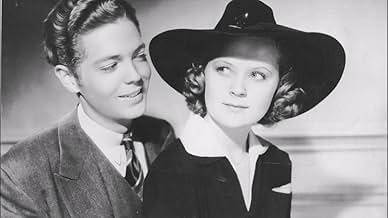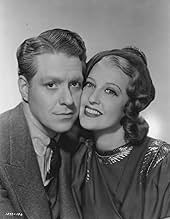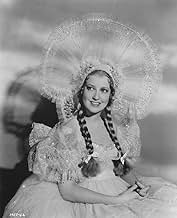Füge eine Handlung in deiner Sprache hinzuThe team behind a successful Broadway production tries to stop the married stars from transitioning to Hollywood.The team behind a successful Broadway production tries to stop the married stars from transitioning to Hollywood.The team behind a successful Broadway production tries to stop the married stars from transitioning to Hollywood.
- Für 2 Oscars nominiert
- 5 Gewinne & 2 Nominierungen insgesamt
Empfohlene Bewertungen
A high-budget offering for MGM stars Nelson Eddy and Jeanette Macdonald, and the studio's first film to be released in Technicolor (Maytime had been started but not completed in this process), centres on a lovey-dovey couple who have worked for years in a Broadway success and are offered the chance to work in Hollywood. How do their theatre collaborators stop them going there?
Unusually for films featuring the Singing Sweethearts, this one has a sparky and funny script (largely by Dorothy Parker and Alan Campbell) from which it benefits. Not many songs have survived from the Broadway production of the real 'Sweethearts' (sadly, the omissions include 'The Cricket on the Hearth', which was really quite a sweet song), and others have been added to flesh out the Hollywood fantasy. Perhaps the best numbers are 'Pretty as a Picture' and 'On Parade'.
In support are Frank Morgan ('the Wizard of Oz'), Ray Bolger (not used anywhere near enough), and the poor man's Eddy and Macdonald, Douglas MacPhail and Betty Jaynes, who suffer from a total lack of charisma. The leads themselves are fine and do with the more meaty than usual material. Perhaps their more slushy collaborations such as 'Rose Marie' and 'Maytime' are better overall, but 'Sweethearts' is definitely worth a look.
Unusually for films featuring the Singing Sweethearts, this one has a sparky and funny script (largely by Dorothy Parker and Alan Campbell) from which it benefits. Not many songs have survived from the Broadway production of the real 'Sweethearts' (sadly, the omissions include 'The Cricket on the Hearth', which was really quite a sweet song), and others have been added to flesh out the Hollywood fantasy. Perhaps the best numbers are 'Pretty as a Picture' and 'On Parade'.
In support are Frank Morgan ('the Wizard of Oz'), Ray Bolger (not used anywhere near enough), and the poor man's Eddy and Macdonald, Douglas MacPhail and Betty Jaynes, who suffer from a total lack of charisma. The leads themselves are fine and do with the more meaty than usual material. Perhaps their more slushy collaborations such as 'Rose Marie' and 'Maytime' are better overall, but 'Sweethearts' is definitely worth a look.
Sweethearts is the first of two of the Jeanette MacDonald/Nelson Eddy films to be done in technicolor, the second at last being Bittersweet. It is also the first MGM film done in modern technicolor, though in Jeanette's The Cat and the Fiddle, the last 10 minutes were in color. And it is the only one of their films besides Bittersweet where they start off as man and wife.
The original operetta by Victor Herbert was done in 1913 and it was in fact a story set in Holland as the numbers do show. But this film is like the later one Nelson did with Rise Stevens, The Chocolate Soldier, in that he and Stevens are husband and wife appearing in The Chocolate Soldier while the plot of that is taken from Ferenc Molnar's The Guardsman.
Sweethearts has an original script by Dorothy Parker and it involves two happily married singing co-stars of a long running operetta, named Sweethearts. They've been appearing on Broadway for seven years in the same show.
In fact a whole cottage industry has grown up around Sweethearts. Producer Frank Morgan, songwriter Herman Bing, librettist Mischa Auer have had it real good for seven years. They've been quite content to live off the box office of Sweethearts as long as MacDonald and Eddy keep appearing. Also the extended families of both Eddy and MacDonald live off of them as well.
When Reginald Gardiner woos them on behalf of Hollywood producer George Barbier, panic ensues among the ranks of the cottage industry. These people might actually have to go to work.
Knowing Dorothy Parker wrote 50% of the script, you can imagine it is a witty one. Jeanette and Nelson are in good voice and the musical calls for a large number of duets. They sing the title song, For Every Lover Meets His Fate, and an interpolated non Victor Herbert song, Our Little Grey Home in the West in anticipation of their California excursion. In addition Jeanette sings A Summer Serenade which was originally an instrumental Victor Herbert composition entitled Badinage. Robert Wright and Chet Forrest gave it some lyrics for the film. Nelson has a good typical Nelson marching song in On Parade.
After appearing with Nelson Eddy in Rosalie as a sidekick Ray Bolger didn't have as many scenes, but got to show his dancing talent a lot more in the Wooden Shoes number. Jeanette personally interceded with Louis B. Mayer and got Douglas MacPhail and Betty Jaynes cast as their understudies.
MacPhail and Jaynes married later on, but divorced after MacPhail's career took a nosedive in the early Forties. He was a good singer who you might remember appeared with Mickey Rooney and Judy Garland in Babes in Arms and later introduced the Cole Porter classic, I Concentrate on You in Broadway Melody of 1940. Tragically he took his own life after the divorce for God only knows what reasons.
For Jeanette and Nelson fans and for those who like to see Ray Bolger in something else besides The Wizard of Oz, Sweethearts in highly recommended.
The original operetta by Victor Herbert was done in 1913 and it was in fact a story set in Holland as the numbers do show. But this film is like the later one Nelson did with Rise Stevens, The Chocolate Soldier, in that he and Stevens are husband and wife appearing in The Chocolate Soldier while the plot of that is taken from Ferenc Molnar's The Guardsman.
Sweethearts has an original script by Dorothy Parker and it involves two happily married singing co-stars of a long running operetta, named Sweethearts. They've been appearing on Broadway for seven years in the same show.
In fact a whole cottage industry has grown up around Sweethearts. Producer Frank Morgan, songwriter Herman Bing, librettist Mischa Auer have had it real good for seven years. They've been quite content to live off the box office of Sweethearts as long as MacDonald and Eddy keep appearing. Also the extended families of both Eddy and MacDonald live off of them as well.
When Reginald Gardiner woos them on behalf of Hollywood producer George Barbier, panic ensues among the ranks of the cottage industry. These people might actually have to go to work.
Knowing Dorothy Parker wrote 50% of the script, you can imagine it is a witty one. Jeanette and Nelson are in good voice and the musical calls for a large number of duets. They sing the title song, For Every Lover Meets His Fate, and an interpolated non Victor Herbert song, Our Little Grey Home in the West in anticipation of their California excursion. In addition Jeanette sings A Summer Serenade which was originally an instrumental Victor Herbert composition entitled Badinage. Robert Wright and Chet Forrest gave it some lyrics for the film. Nelson has a good typical Nelson marching song in On Parade.
After appearing with Nelson Eddy in Rosalie as a sidekick Ray Bolger didn't have as many scenes, but got to show his dancing talent a lot more in the Wooden Shoes number. Jeanette personally interceded with Louis B. Mayer and got Douglas MacPhail and Betty Jaynes cast as their understudies.
MacPhail and Jaynes married later on, but divorced after MacPhail's career took a nosedive in the early Forties. He was a good singer who you might remember appeared with Mickey Rooney and Judy Garland in Babes in Arms and later introduced the Cole Porter classic, I Concentrate on You in Broadway Melody of 1940. Tragically he took his own life after the divorce for God only knows what reasons.
For Jeanette and Nelson fans and for those who like to see Ray Bolger in something else besides The Wizard of Oz, Sweethearts in highly recommended.
"Sweethearts" has so much going for it that it's painful to admit to some lesser Victor Herbert songs as main features. Eddy and MacDonald are fine, the Technicolor is lovely, and the cast is top notch. Unfortunately, there are only about two songs that are worthy of the great Herbert.
Well, every composer can't turn out all hits; it's just unfortunate that the lesser songs are given such up front treatment. As much as the stars pour their all into these songs, they fall rather flat and unmemorable.
The production numbers are spectacular, the production design lovely, and the costumes eye-popping. Too bad this one didn't rise to the level of the duo's other film entries. Still, kudos to the quality of both the singing and acting of Eddy-MacDonald.
Well, every composer can't turn out all hits; it's just unfortunate that the lesser songs are given such up front treatment. As much as the stars pour their all into these songs, they fall rather flat and unmemorable.
The production numbers are spectacular, the production design lovely, and the costumes eye-popping. Too bad this one didn't rise to the level of the duo's other film entries. Still, kudos to the quality of both the singing and acting of Eddy-MacDonald.
Much has been made of Jeanette MacDonald's singing, but there is never much mention of her beauty. She was very beautiful, with a vibrant personality and good acting ability. All of this is shown to advantage in this big-budget MGM extravaganza, "Sweethearts," a huge 1938 hit in which MacDonald costarred during her successful partnership with Nelson Eddy.
This isn't really the operetta "Sweethearts" - rather, it's a modern story about a couple starring in a show called "Sweethearts" on Broadway. The script is by Alan Campbell and Dorothy Parker, and we meet our singing lovebirds, married in real life, in their sixth year run of the show. Hollywood is beckoning to them; the couple is exhausted by an endless round of shows, radio appearances, and parties they must attend. Hollywood - the free evenings, the time off between films, the sunshine - is starting to sound pretty good to them. The producers of the show are in a panic. They have to keep them from going to Hollywood; since Hollywood is interested in both of them as a team, perhaps if they were no longer a team...
I've read a good deal here about "glorious Technicolor" - it's beautiful but a little garish. The film is filled, naturally, with lots and lots of music. MacDonald's voice never did much for me - nice middle, not much of a top most of the time - probably due to the way singers were taught back then. Eddy is extremely handsome in Technicolor and his magnificent baritone is well-served by the music.
I was recently reading about the stories that have been going around for years that the couple was secretly in love, supposedly supported by MacDonald's sister. It's the subject of a new musical and book. MacDonald's husband Gene Raymond did indeed resemble Eddy, and her marriage to Raymond was a Louis B. Mayer special - arranged. I think there is probably truth to the stories, and it makes sense that one reason for not marrying was that Eddy wouldn't have wanted her to work.
I read a comment here that the script is dated, etc. - MacDonald and Eddy were of their time, and they need to be appreciated in that context. When that is done, they bring us back to a more innocent time, pre-World War II, and they're wonderful.
This isn't really the operetta "Sweethearts" - rather, it's a modern story about a couple starring in a show called "Sweethearts" on Broadway. The script is by Alan Campbell and Dorothy Parker, and we meet our singing lovebirds, married in real life, in their sixth year run of the show. Hollywood is beckoning to them; the couple is exhausted by an endless round of shows, radio appearances, and parties they must attend. Hollywood - the free evenings, the time off between films, the sunshine - is starting to sound pretty good to them. The producers of the show are in a panic. They have to keep them from going to Hollywood; since Hollywood is interested in both of them as a team, perhaps if they were no longer a team...
I've read a good deal here about "glorious Technicolor" - it's beautiful but a little garish. The film is filled, naturally, with lots and lots of music. MacDonald's voice never did much for me - nice middle, not much of a top most of the time - probably due to the way singers were taught back then. Eddy is extremely handsome in Technicolor and his magnificent baritone is well-served by the music.
I was recently reading about the stories that have been going around for years that the couple was secretly in love, supposedly supported by MacDonald's sister. It's the subject of a new musical and book. MacDonald's husband Gene Raymond did indeed resemble Eddy, and her marriage to Raymond was a Louis B. Mayer special - arranged. I think there is probably truth to the stories, and it makes sense that one reason for not marrying was that Eddy wouldn't have wanted her to work.
I read a comment here that the script is dated, etc. - MacDonald and Eddy were of their time, and they need to be appreciated in that context. When that is done, they bring us back to a more innocent time, pre-World War II, and they're wonderful.
While there films are not nearly so popular today, Jeanette MacDonald and Nelson Eddy were incredibly hot properties for MGM and this would explain why MGM made "Sweethearts" in full Technicolor...something they'd never done with a full length film. Many studios had made films using cheaper (and inferior) color stock such as Two-Color Technicolor and the new, improved full color from Technicolor was expensive and MGM pulled out all the stops for their big team.
MacDonald and Eddy play Gwen Marlowe and Ernest Lane, a pair of Broadway stars who have been packing theaters for years with their latest show, "Sweethearts". Not surprisingly, Hollywood comes knocking...and Marlowe and Lane's handlers do their best to try to hold on to them and prevent their defection to the West Coast.
As you watch this, you might think that the Technicolor is a bit garish and intense. This was often the case with early Technicolor...partly because of the film process and partly because its inventor insisted that his ex-wife, Natalie Kalmus, be the color consultant...and she determined the colors of the costumes, sets and the like. And, of the stars, MacDonald comes off the worst because she appears so incredibly ruddy in the film....and rather unnatural.
As you'd expect in one of their films, there is a LOT of singing...intense singing and big stage production numbers. This is the style of their films...a style which seemed to grow less and less popular into the 1940s and 50s. You either like it or you don't. As for the rest of the story, it's enjoyable and well made. I didn't mind the story at first, but found it really tanked when MacDonald's character changed...becoming rather demanding and nasty and VERY jealous. This was NOT a welcome story element. I also found the musical numbers difficult to enjoy because it's a style I've never been all that fond of seeing and hearing in films.
MacDonald and Eddy play Gwen Marlowe and Ernest Lane, a pair of Broadway stars who have been packing theaters for years with their latest show, "Sweethearts". Not surprisingly, Hollywood comes knocking...and Marlowe and Lane's handlers do their best to try to hold on to them and prevent their defection to the West Coast.
As you watch this, you might think that the Technicolor is a bit garish and intense. This was often the case with early Technicolor...partly because of the film process and partly because its inventor insisted that his ex-wife, Natalie Kalmus, be the color consultant...and she determined the colors of the costumes, sets and the like. And, of the stars, MacDonald comes off the worst because she appears so incredibly ruddy in the film....and rather unnatural.
As you'd expect in one of their films, there is a LOT of singing...intense singing and big stage production numbers. This is the style of their films...a style which seemed to grow less and less popular into the 1940s and 50s. You either like it or you don't. As for the rest of the story, it's enjoyable and well made. I didn't mind the story at first, but found it really tanked when MacDonald's character changed...becoming rather demanding and nasty and VERY jealous. This was NOT a welcome story element. I also found the musical numbers difficult to enjoy because it's a style I've never been all that fond of seeing and hearing in films.
Wusstest du schon
- WissenswertesThis is MGM's first full-length film to feature a different lion roaring in the logo, by the name of Tanner. He appeared at the beginning of MGM's Technicolor feature films and cartoons from 1936 to 1956 and later, from 1963 to 1967.
- Zitate
Felix Lehman: [Counting on Gwen and Ernest's gullibility] I'm an old man and I don't get many pleasures, but you go ahead. Just think about yourselves. Forget about me.
- Crazy CreditsA written epilogue explains: "In our screen play, certain dramatic liberties have been taken with the operetta 'SWEETHEARTS'. We depict the scenes from the operetta as though it was a recent production presented by a wholly fictitious producer Felix Lehman and composed and written by two wholly imaginary persons Oscar Engel and Leo Kronk whereas the stage operetta 'SWEETHEARTS' was actually written and produced on the stage about 1913, Victor Herbert composing the music and Frédérique De Grésac (as Fred de Gresac), Robert B. Smith and Harry B. Smith writing the book and lyrics."
- VerbindungenFeatured in Nelson and Jeanette (1993)
- SoundtracksSweethearts
(1938) (uncredited)
Music by Victor Herbert (1913)
Lyrics by Bob Wright and Chet Forrest
Played during the opening credits and often in the score
Performed by Jeanette MacDonald and Nelson Eddy
Reprised by them for a radio broadcast with chorus
Later sung by MacDonald with Douglas McPhail and Eddy with Betty Jaynes
Top-Auswahl
Melde dich zum Bewerten an und greife auf die Watchlist für personalisierte Empfehlungen zu.
Details
- Erscheinungsdatum
- Herkunftsland
- Sprache
- Auch bekannt als
- Ljubavnici
- Drehorte
- Produktionsfirma
- Weitere beteiligte Unternehmen bei IMDbPro anzeigen
- Laufzeit
- 1 Std. 54 Min.(114 min)
- Farbe
- Seitenverhältnis
- 1.37 : 1
Zu dieser Seite beitragen
Bearbeitung vorschlagen oder fehlenden Inhalt hinzufügen

